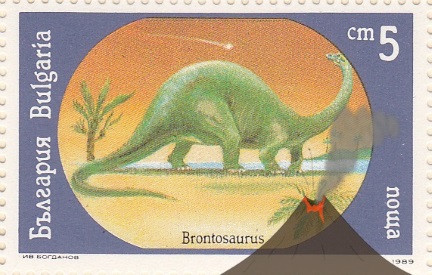Asteroids, Volcanoes, and Dinosaur Extinction
There are many speculations put forward as to why dinosaurs became extinct, and some are rather outlandish. The most common idea is that an asteroid fell to Earth and caused them to head for the last roundup, but it doesn't have a lot of explaining power. Others have suggested that volcanoes had something to do with the dino die-out. Lately, some geology work prompted a new idea: both asteroids and volcanoes.
While uniformitarian assumptions and the circular reasoning in radiometric dating are unreliable, they do give relative dates to work from. Some Genesis Flood geology models postulate that, since the rain was supplemented by the fountains of the deep being broken up (Genesis 7:11), an asteroid impact may have been a part of the great global Flood. Rapid fossilization, plate tectonics, volcanic activity, the Ice Age, change in climate — the whole shootin' match supports creation science models.
 |
| Scan of Bulgaria stamp from my collection, with added clip art from Clker |
There have been many dinosaur extinction hypotheses. For the past 25 years since the discovery and identification of the Chicxulub crater in Mexico’s Yucatán Peninsula, the asteroid impact theory has been the dominant model. There have been a number of scientists who favored the Volcanic Demise hypothesis though, and some have even proposed a combination of impact and volcanism. A more recent discovery reported in October seems to bolster the latter argument.To read the rest and find out a creationist view of dinosaur extinction, click on "Asteroids Hit First, Volcanoes Deliver Knockout Punch to Dinosaurs?"